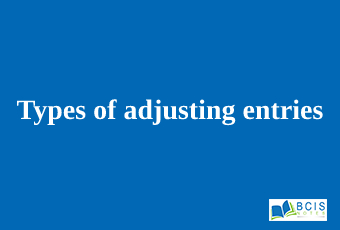
Types of adjusting entries
Types of adjusting entries are required at the end of each fiscal period to align the revenues and expenses to the “right” period, in accord with the matching principle in accounting. In general, there are two types of adjusting journal entries: accruals and deferrals. Adjusting entries are booked before financial statements are released. Adjusting entries are a crucial part of the accounting process and are usually made on the last day of an accounting period.
The two main categories where adjustments arise are:
Accruals: Revenues earned or expenses incurred that have not been previously recorded
Deferrals: Receipts of assets or payments of cash in advance of revenue or expense recognition
An example of adjusting entries
Imagine there is a company called XYZ Company that took out a loan from a bank on December 1, 2017. The first interest payment is to be made on June 30, 2018, and the company is preparing its financial statements for the year ending December 31, 2017. Even though the interest payment is to be made on June 30 in the following year, to properly report the company’s financial status, the company must accrue the interest expense for the month of December and include that value even though the expense was not actually paid (i.e., an exchange in cash).
This is an accounting system called the accrual basis of accounting. The accrual basis of accounting states that expenses are matched with related revenues and are reported when the expense is incurred, not when cash changes hand. Therefore, they are required because of the matching principle in accounting.
Four Types of Adjusting Journal Entries
There are four specific types of adjustments:
- Accrued expenses
The process of recognizing expenses before cash is paid.
- Accrued revenues
When revenues are earned but not yet recorded at the end of the accounting period because an invoice has not yet been issued, nor has cash payment been received.
- Deferred expenses
Amount paid for in advance of using assets that benefit more than one period.
- Deferred revenues
When cash is received prior to earning revenue by delivering goods or services, the company records a journal entry to recognize unearned revenue.
These adjusting entries are depicted in the following tables with specific examples and journal entries.
Additional Resources
Hopefully, this has been a helpful guide to adjusting entries, and in particular, the journal entries that are required. To keep learning and developing your career we recommend the additional CFI resources below:
- Journal Entries
- T Accounts
- Income statement template
- How to link the 3 statements
You may also like Cash versus accrual basis of accounting

Leave a Reply